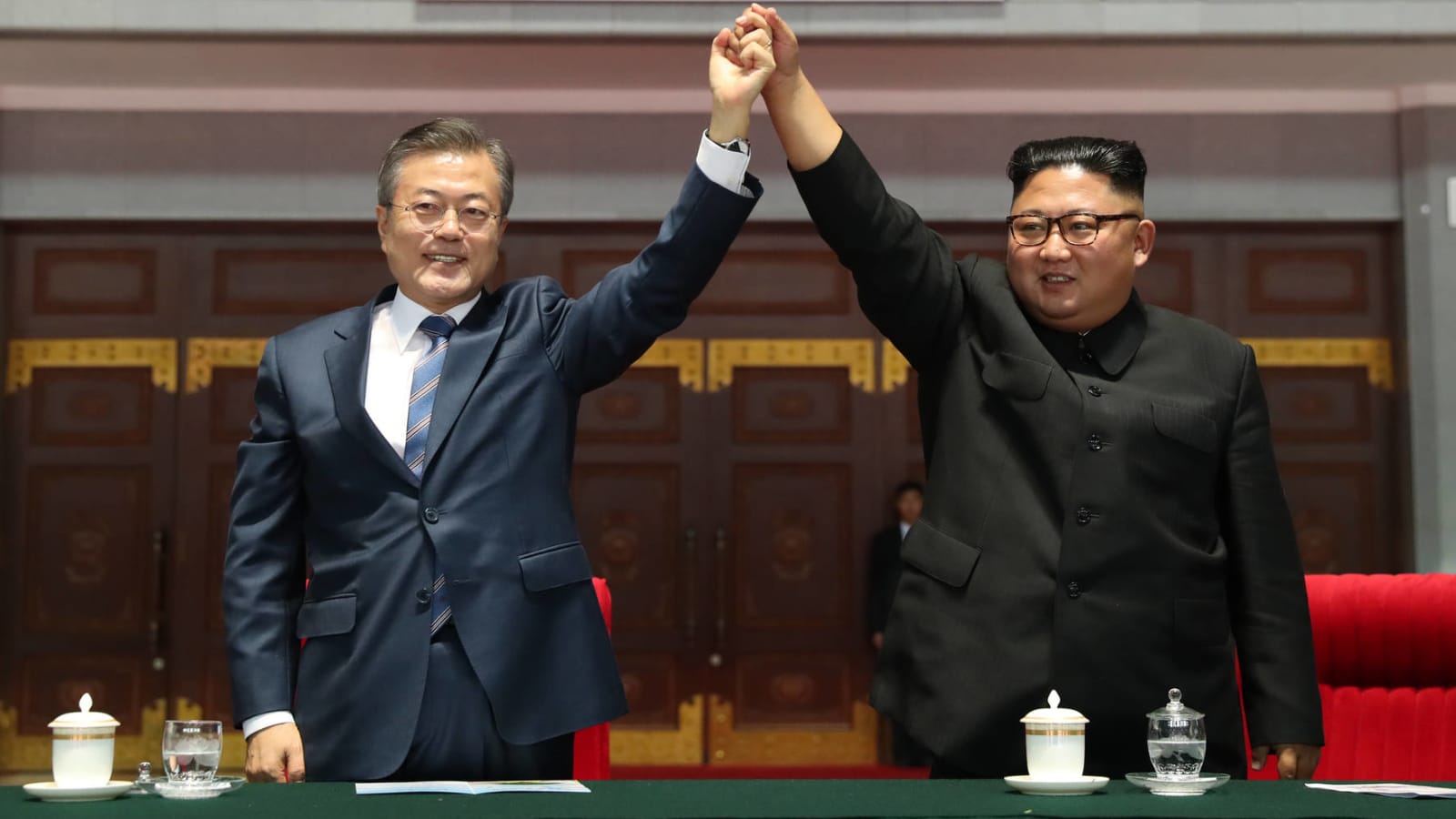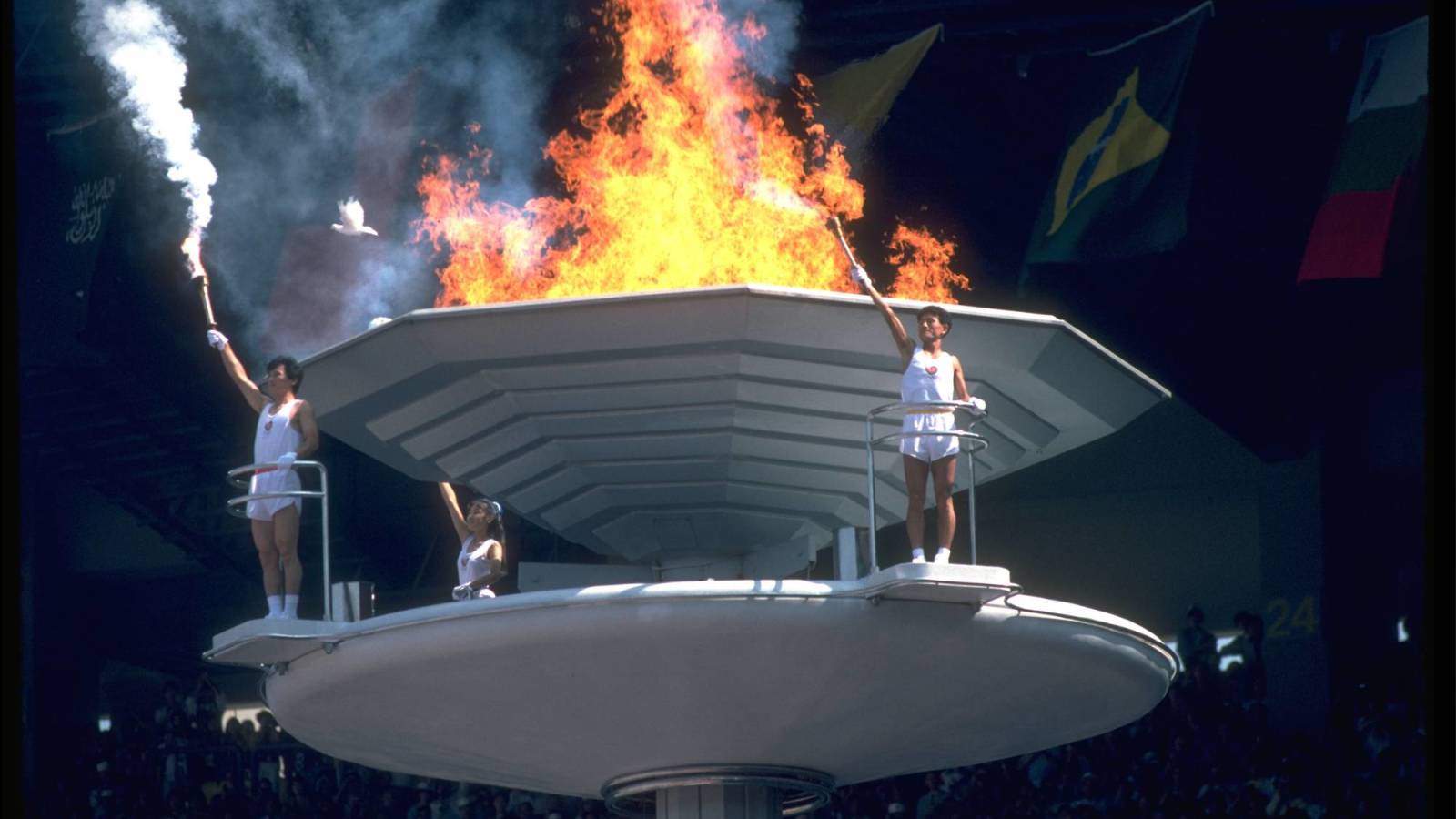
Sports & Politics Intersect: North and South Korea planning historic joint Olympics bid
“It’s a proposal of hosting the events in Seoul and Pyongyang. The Pyeongchang Winter Olympics showed the Olympic values very well. I hope peace in Northeast Asia can continue through sports.” - Do Jong-hwan on the joint proposal between North and South Korea to host the 2032 Olympics.
North and South Korea are once again taking steps toward ending the military, political, social and economic tensions between the two countries. On Sept. 20, the two countries agreed to withdraw guard posts from the Demilitarized Zone that separates the two countries and improve on trade efforts by building new trains that will travel between the two nations on each coast. Another agreement: They’ll submit a joint bid to host the 2032 Olympics.
North Korean leader Kim Jong-un and South Korean President Moon Jae-in began the process of smoothing things over when North Korea sent 32 athletes to participate in the Winter Olympics earlier this year. If nothing else, sport is proving to be quite the ambassador, but what will this mean for the countries moving forward?
With the world looking on and following what will happen with the two countries, it’ll be in North Korea’s best interest to move toward denuclearization and eliminate some of the human rights issues that have plagued the country since the armistice of the Korean War. There are international sanctions that bar major investment in North Korea, and if these sanctions remain in place by 2025 when a new host is selected, it will be easy for the IOC to pass on the joint bid.
In the best interest of both countries, North Korea will have to be on its best behavior and improve on relations with nations around the world — one of which, obviously, is the United States. Kim wants President Donald Trump to sign a peace declaration that would effectively end the Korean War and ensure that the U.S. will not attack North Korea.
There are still a lot of moving parts to make anything like that happen, but the United States working with the North Korean government could be a huge step in an ongoing international tension that could symbolically come to an end with one of the biggest sporting events in the world.
Need to know now:
Cuban didn’t pay attention to toxic corporate culture with Mavs - Findings from the NBA’s investigation into the Dallas Mavericks described a business environment “rife with misogyny and predatory sexual behavior," and that owner Mark Cuban had not paid attention to the internal toxicity. Neither the Mavericks nor Cuban were formally disciplined, but the billionaire will donate $10 million to organizations dedicated to female empowerment and combating domestic violence.
WADA surprisingly lifts ban on Russia - The World Anti-Doping Agency (WADA) ended Russia’s three-year suspension for its systemic doping program by restoring the testing abilities of Rusada (Russia Anti-Doping Agency). The organization, which has struggled to get financial support from member nations, announced its decision in a rather lavish location, which may have brought about extra anger from all over the globe, including the U.K. and the U.S. WADA had tried to lift the ban back in May with cooperation from Rusada, but the Russians didn’t agree to those terms.
‘Black-ish’ star wears Nike outfit as nod to Kaepernick - Jenifer Lewis, who plays Ruby Johnson in the hit sitcom “Black-ish,” wore a full Nike ensemble to the Emmys in support of Colin Kaepernick. Lewis commended the apparel company for its deal with the free agent quarterback/activist.
Texas town calls O’Rourke’s support of athlete protests “false” - In Reno, Texas, the city council passed a resolution condemning Beto O’Rourke’s viral defense of the athlete protests during the national anthem. Mayor Eric Hunter said it was a way of showing that the Democratic candidate for U.S. Senator was wrong in believing that the protests didn’t disrespect service veterans.
Todd McNair case threatens NCAA membership of California schools - A Los Angeles County Superior Court judge ruled that the show-cause penalty against Todd McNair, the former running backs coach at USC, violated state law. Pac-12 commissioner Larry Scott was displeased with the tentative ruling, stating that if the conference’s California schools — USC, UCLA, Stanford and Cal — adhered to the decision and did not honor the show-clause penalty, their memberships in the NCAA would be at stake.
University of Cincinnati settles lawsuit with athlete for Instagram photos - Earlier this year, University of Cincinnati volleyball player Shalom Ifeanyi sued the school and its women’s volleyball coach, Molly Alvey, for allegations of discrimination and retaliation. She claimed that she was kicked off the team because her Instagram photos were “too sexy” and did not fit a “biased image” of the team. UC settled with Ifeanyi, who must sit out for the 2018-19 before transferring.
NHL teams getting more comfortable with bettors - As if destined, the Vegas Golden Knights inked a multiyear marketing agreement with U.K. bettor William Hill — becoming the first team of the four major men’s sports leagues in the United States to make a deal with a sportsbook. (Actual gambling won’t take place at the T-Mobile Arena.) Meanwhile, the New Jersey Devils expect to bring in about $5 million of revenue from their own partnerships with sportsbooks, as they’re the only other NHL team that plays in a state with legalized sports betting.
Homeless football player caught up in eligibility debate - Jamal Speaks, a high school running back in the Washington D.C. area, was not allowed to play a game last weekend while different governing bodies were trying to sort out his eligibility due to his homelessness and not having a permanent address. Speaks recently committed to Temple and is allowed to play in the next game.
Skeptics warn Calgary about Olympic hopes - Organizers for Calgary’s bid for the 2026 Winter Olympics revealed their plans for the event. But per usual with the Games, economists believe that the economic benefits to the city and surrounding region are exaggerated. Calgary last hosted the Winter Games in 1988.
Texas school super regrets racist comment toward Deshaun Watson - Lynn Redden, the superintendent of Onalaska Independent School District in eastern Texas, regrets making racist comments about Houston Texans quarterback Deshaun Watson. After the Texans lost a close game to the Tennessee Titans, Redden posted on Facebook that “when you need precision decision-making, you can’t count on a black quarterback.” That was not precise decision-making.
Michael Jordan, NFL donating funds for Florence relief - Basketball icon and Charlotte Hornets owner Michael Jordan has donated $2 million toward relief efforts in the aftermath of Hurricane Florence, which ravaged his home state of North Carolina. (Jordan hopes others follow suit.) The NFL is doing its part as well, donating $1 million to the efforts through its foundation. Carolina Panthers star Julius Peppers announced his own relief fund Friday, starting it off with a $100k donation.
Wrestler remembered for saving fellow athletes from suicide bomber - In Afghanistan, 20-year-old Gula Reza Ahmadi sacrificed himself by giving warning of an Islamic State suicide bomber who attempted to blow up the wrestling club he was a member of. As Ahmadi was remembered, it was another painful moment for the wrestling community there, which holds both the Islamic State and the government responsible for the violence.
NHL making inroads in China - After sitting out of the 2018 Winter Olympics, the NHL hopes that it can use the 2022 Games in Beijing to grow the game of hockey in China. The league will be hosting preseason games in Shenzhen and Beijing, and the Stanley Cup has toured the Asian nation for fans to pose with and touch.
Profile in golf media leads to vacated murder conviction - In the Buffalo area, Valentino Dixon had served 27 years in prison for a 1991 murder he didn’t commit. His 39-years-to-life sentence was vacated thanks to, of all things, a sport he loved to draw about but never played. Profiles in Golf Digest about his art led to its pushing the state to reopen the case and reexamine the evidence.
This week in sports and politics history: Looking back at the start of the 1988 Olympic Games in Seoul

" [The] North Korean regime we face today — isolated, belligerent, desperately pumping up its dangerous nuclear program as its only leverage on the world stage — was born, in part, in 1988. At the Olympics." - Sheila Miyoshi Jager, professor of history and East Asian Studies at Oberlin College.
As noted above, earlier this week, the leaders of North and South Korea got together to discuss a possible roadway to peace between them, as the neighboring countries have officially been at war since 1950. While there are still several key steps left before achieving peace in the peninsula, progress does appear to have been made. These latest developments are a stark contrast from where tensions were during the 1988 Summer Olympics held in Seoul, South Korea.
That the International Olympic Committee awarded the 1988 Games to Seoul was seen as a big coup by the South Korean government — the sporting event would serve as a "we've arrived" type of party for the struggling nation. Not to be outdone, Kim Il Sung (grandfather of Kim Jong Un) pushed hard for the games to be hosted by both countries. There were initial negotiations, but ultimately they fell apart. Rather than taking the L, Kim Il Sung announced that his country would be boycotting, and he asked the Soviet Union to back North Korea in its protest. That didn't happen, which South Korea saw as reason enough to end the negotiations. Humiliated, North Korea sought other means to derail the Olympics, namely by blowing up, in midair, a Korean Air plane headed to Seoul on Nov. 29, 1987. The bombing didn't come as much of a surprise to at least one entity — the CIA. According to recently declassified records, the agency expressed concern that North Korea would try something.
The state-sponsored act of terror was immediately decried by the international community. North Korea tripled down — it hosted its own version of the Games, and isolated from the world, embarked on its journey to obtain a nuclear weapon.
The Games were a major political success for South Korea. For starters, it earned the country the support of the majority of the world, including the Soviet Bloc countries, which were forced to recognize its sovereignty. Just as importantly, North Korea's actions gave its southern neighbors a perfect distraction for all the human rights atrocities it committed prior to the start of the 1988 Olympics.
More must-reads:
- Mavericks hit with sanctions over workplace misconduct
- Kaepernick’s lawyer hints that two NFL teams are interested
- The 'Most points in a playoff game by team' quiz
Breaking News
Customize Your Newsletter
 +
+
Get the latest news and rumors, customized to your favorite sports and teams. Emailed daily. Always free!

